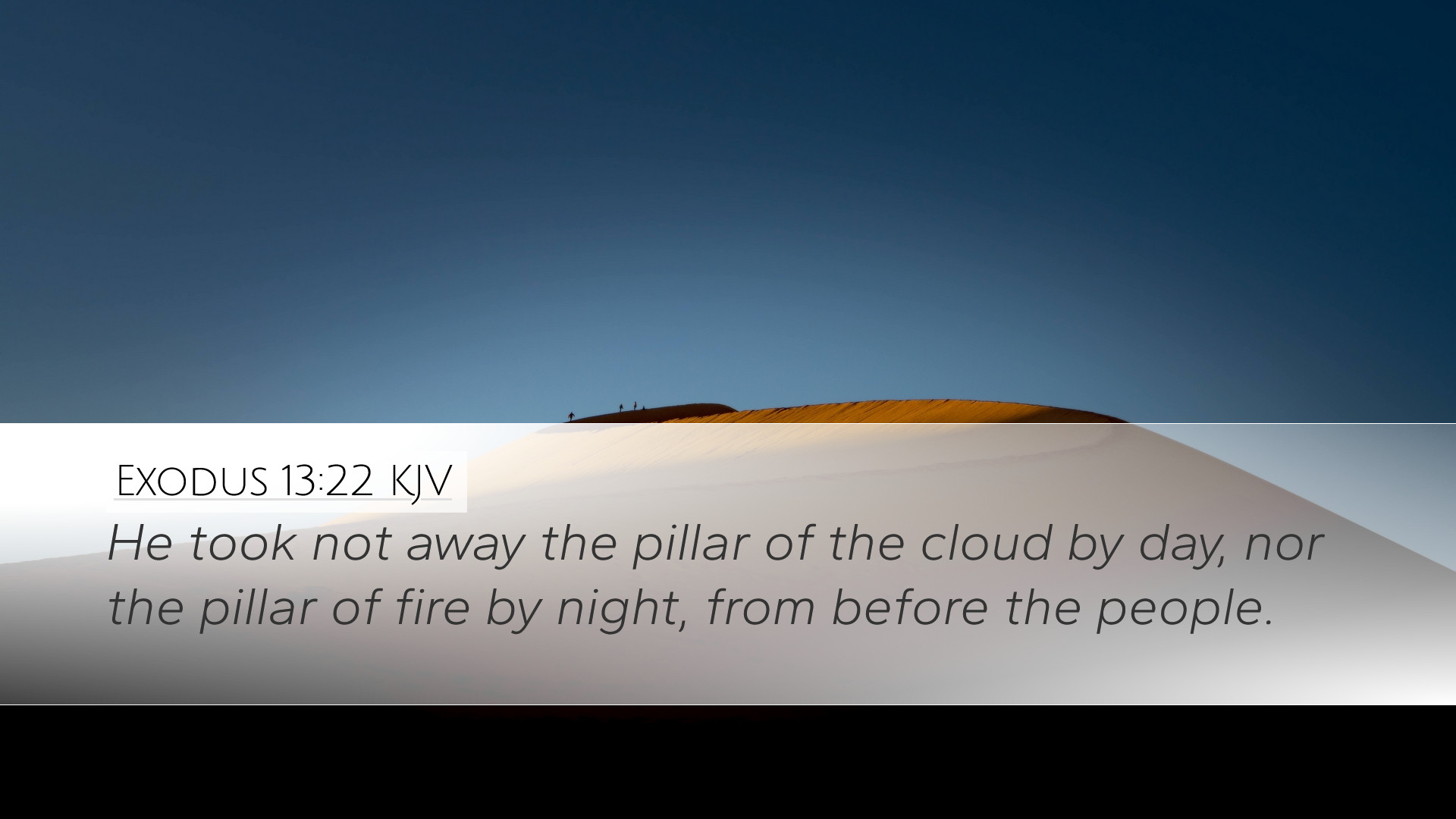Commentary on Exodus 13:22
Exodus 13:22: “He did not take away the pillar of cloud by day or the pillar of fire by night from before the people.”
Introduction
This verse serves as a profound closing statement to the account of the Israelites' exodus from Egypt and highlights God's continuous and guiding presence. Through the clouds by day and the fire by night, Yahweh leads His people amidst their journey in the wilderness. In examining this verse, insights from various public domain commentaries will shed light on the theological significance and practical applications of God’s guidance through tangible manifestations.
The Presence of God
Matthew Henry's Overview: Matthew Henry emphasizes the divine provision in the guidance of the Israelites. The persistent presence of the pillars symbolizes God’s unwavering support and guidance despite the uncertainties they faced. It encapsulates God’s promise that He would be with His people, which is a recurring theme throughout the Scriptures. The cloud by day offered protection from the sun, and the fire by night provided warmth and visibility, reflecting God's holistic provision for His people.
Albert Barnes' Commentary: Albert Barnes extends upon the idea of the manifestations of God’s presence. He notes that the features of both the pillar of cloud and fire highlight not only guidance but also the dual aspects of God's nature—being both comforting and fearsome. The cloud obscured harsh realities of the harsh wilderness by day while the fire illuminated darkness and danger during the night. This showcases God as both protector and guide, who ensures the safety of His people in dangerous terrains.
Symbolism of the Pillars
Adam Clarke's Insights: Adam Clarke expounds on the symbolism inherent in the pillars. The cloud represents the divine covering and protection from the elements and oppressors, while the fire denotes illumination and divine visitation. Clarke informs that these elements also symbolize the Holy Spirit—who protects, guides, and empowers believers throughout their spiritual journey. The presence of God in such physical manifestations instills comfort and reassurance to the people of Israel during uncertain times.
Theological Implications
- Continuous Guidance: The fact that God did not withdraw these pillars indicates that His guidance is continuous. Underpinning this is a theological understanding that God remains present in both the mundane and extraordinary facets of life.
- The Abiding Presence: The pillars serve as a reminder of God’s abiding nature—He does not forsake His people. Just as He was with the Israelites, He is also with His followers today, as symbolized by the presence of the Holy Spirit.
- Leadership Lessons: For pastors and spiritual leaders, these pillars teach about the necessity of divine direction in leadership. Seeking God’s guidance through prayer ensures that leaders can adequately shepherd their congregations through trials and tribulations.
Practical Applications
In addition to theological implications, this verse carries several practical applications for today’s believers:
- Trust in God’s Guidance: Believers are reminded of the importance of trusting in God's plan even when the path is unclear or fraught with challenges. Just as the Israelites had visible signs, Christians today can seek discernment through prayer and the Word of God.
- Reminders of God’s Presence: Incorporating symbols of faith in daily life can serve as reminders of God's presence—be it through scripture, prayer, or community fellowship. These reminders provide comfort amid trials.
- Prayer and Seeking Clarity: Engaging in regular prayer and seeking clarity from God ensures the journey through life is navigated in accordance with His will, particularly during transitions or when facing major decisions.
Conclusion
Exodus 13:22 encapsulates a pivotal moment in the journey of the Israelites, signifying God's unfailing promise to guide and protect His people. The commentary from Matthew Henry, Albert Barnes, and Adam Clarke collectively enrich our understanding of Scripture through their emphasis on the active, guiding presence of God. This verse invites reflection on God’s continuous commitment to lead His people, encouraging all believers to remain attuned to His guidance in their spiritual lives.


